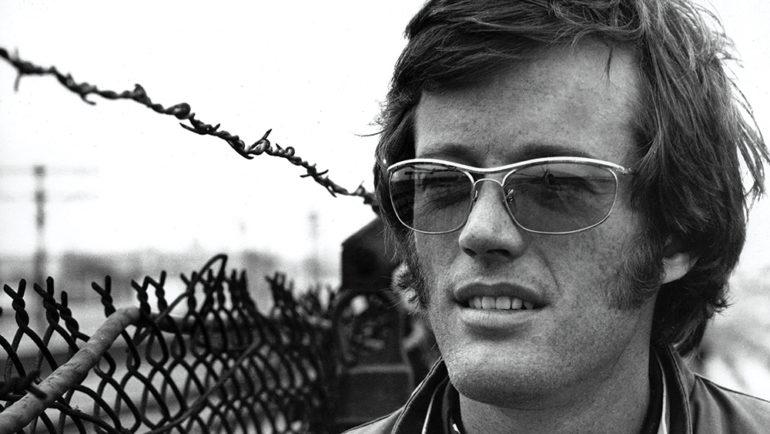Remembering Peter Fonda, Indie Revolutionary and Counterculture Icon (Column)
By Peter Debruge
LOS ANGELES (Variety.com) – Captain America has died. Not the spandex-clad Marvel superhero, but counterculture poster boy Peter Fonda, who shook up Hollywood and revolutionized the country’s sense of itself by co-writing, producing and starring in “Easy Rider” 50 years ago this summer — the same summer depicted in Quentin Tarantino’s “Once Upon a Time … in Hollywood.”
Culture was changing fast in 1969. Though Tarantino was hard on the hippies, “” — an existential biker picture in which Fonda’s Wyatt, with Dennis Hopper as wingman Billy, motors coast to coast with the Stars and Stripes on his back and drug money stashed in his shiny red, white and blue gas tank — was the first film to represent the younger generation’s anti-establishment attitudes, and its success pointed the way for the independent cinema movement that followed. The actors rejected mainstream values, struck out on their own and smoked actual pot on camera; rather than judging them for it, the film treated their characters as tragic heroes, contemporary outlaws gunned down by rednecks.
Long-haired and disheveled, Hopper looked like a hippie, but looked like his dad, Henry Fonda, handsome star of such respectable classics as “The Grapes of Wrath” and “12 Angry Men,” with his aristocratic cheekbones, strong chin and intense blue eyes. He was the youth-culture version of an icon, rebel son of the archetypal patriarch, and it meant something seismic to see a figure like this — the descendant of American royalty, who could have gone the Ivy League route, or else enlisted in Vietnam — reject his father’s relatively conservative values.
That don’t-mistake-me-for-Dad attitude was hardly an act. As he told the polite host of a pot-themed podcast last summer, “Mr. Fonda died in ’82. You can call me Peter.”
The star’s “Easy Rider” persona is one that stuck throughout his career, from the bank-robbing hot-rodder of “Dirty Mary, Crazy Larry” to biker-related roles in “Wild Hogs” and “Ghost Rider,” while remaining firmly outside the establishment.
Unlike big sister Jane, who was Oscar nominated for “They Shoot Horses, Don’t They?” the same year “Easy Rider” came out, and who won twice over the subsequent decade, Peter couldn’t match his father’s acclaim. But he didn’t have to. “Easy Rider” wasn’t just a role. It was his own idea, an idea he’d hatched while doing publicity for another impactfully anti-establishment indie, notorious biker-gang sensation “The Wild Angels,” made for Roger Corman’s American Int’l Pictures in 1966.
It was perhaps inevitable that Peter Fonda had to begin his career in his father’s shadow. Reviewing his Broadway debut in 1961’s “Blood, Sweat and Stanley Poole,” Variety wrote, “Peter Fonda, Henry Fonda’s son … makes a lean, blond appearance and has an attractive manner. With considerably more experience, he may also be a good actor some day.” His early big-screen performances for AIP, whether in “The Wild Angels” or psychedelic follow-up “The Trip” (on which he convinced Roger Corman to try LSD), were stiff and unnatural. And the fact that he embraced the drugs his characters so enthusiastically used on screen — most famously dropping acid with the Beatles, which later inspired John Lennon as he wrote the lyrics for “She Said She Said” — may have limited the roles he was offered.
But Fonda never stopped working, his laid-back persona best suited to modern-day stories, though he left his mark on the Western genre with “The Hired Hand” and “3:10 to Yuma.” By the time he made 1997’s “Ulee’s Gold,” he was ready for his best role, that of a gentle beekeeper who must put aside his mild ways to confront his son’s criminal associates — a performance that earned him his one Oscar acting nomination.
Once the radical outsiders, the “Easy Rider” duo went in different directions in the decades that followed. Whereas Hopper pushed his bad-boy image, evolving toward demented villain roles, Fonda kept his cool even as he mellowed into a kind of benign figure: the elder hippie, or seasoned eccentric (see him surfing a tsunami through post-apocalyptic streets in “Escape From L.A.”). “Easy Rider” was an instant sensation in its time, largely on account of how innovative it was — with its pop soundtrack, avant-garde editing and connection to youth culture — and yet Fonda’s Captain America was virtually unprecedented in his pursuit not of wealth or status but of “freedom.”
As Jack Nicholson put it in the famous campfire smoke-out scene, most people fool themselves into believing they’re independent, “but they see a free individual, it’s gonna scare them.” Sure enough, “Easy Rider” freaked out its share of Americans, but it galvanized those who’d never seen anything like it. Blasted off his bike at the end of the film, Fonda became the tragic face of something the world wasn’t ready for — except, as the grass-fueled game changer showed, audiences had been waiting for just such a figure to come along.

